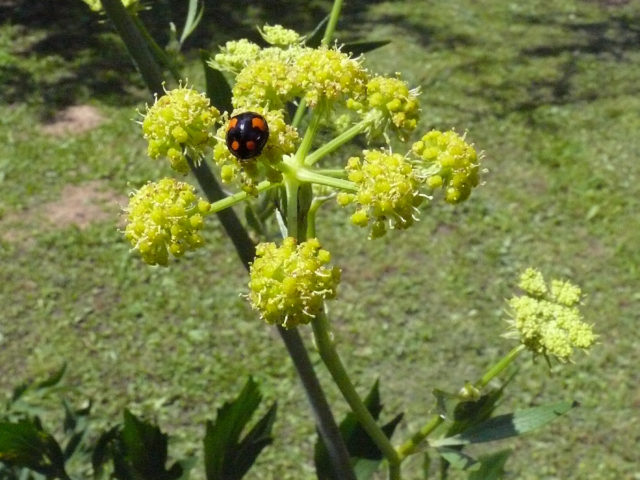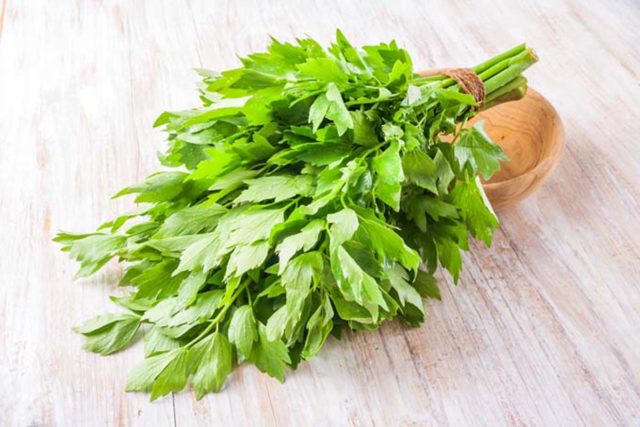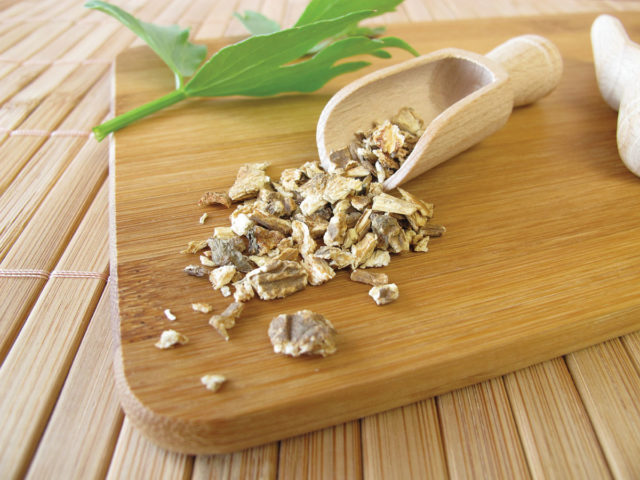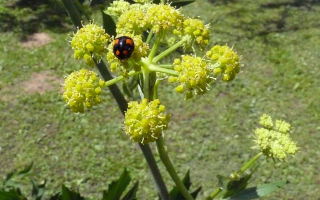Content
The healing properties and use of lovage allow it to be the guardian of health for many years. In ancient times, the plant was used to make a love potion. It has a positive effect on both the female and male body. In terms of the degree of effectiveness, lovage can compete with many drugs.
The chemical composition of lovage herb
Lovage is a perennial plant belonging to the Umbrella family. Its distinctive features include intense aroma, feathery leaves and an erect stem. The main value of the herb is the rich content of essential oils. Its chemical composition is also represented by the following components:
- furocoumarin;
- minerals (magnesium, zinc, manganese, calcium, selenium, iron, copper, phosphorus, potassium);
- rutin;
- ascorbic, angelic and malic acids;
- resins;
- cineole;
- tannins;
- vitamins of groups PP, E, A, K, C and B;
- carotene.

Why is lovage useful for humans
Lovage has a wide range of uses in alternative medicine. It is especially useful to use the herb as a spice in the winter. The rich content of vitamins provides a strong immune system that protects against a number of diseases. Infusions and decoctions are prepared both from the rhizome and from the ground part of the plant.
The healing agent is famous for the following properties:
- getting rid of parasites;
- analgesic effect;
- strengthening the immune system;
- diuretic action;
- normalization of the cardiovascular system;
- getting rid of alcohol addiction;
- relief of inflammatory processes;
- elimination of insomnia;
- fight against neuroses;
- treatment of skin diseases.
Very often lovage is used for worms. The desired effect is achieved due to the burning taste and the ability to raise the body temperature. At the same time, the grass has a disinfecting effect, preventing the reproduction of parasite larvae.
Lovage is also known to be a powerful pain reliever. Moreover, the plant has a beneficial effect on the functioning of the digestive tract. It stimulates the production of gastric juice and cleanses the intestines. Lovage is recommended as a powerful laxative.
Useful properties of lovage herb for men
Lovage can also be used to treat male diseases. The herb is effective in terms of reproductive function. The substances present in its composition increase sexual desire and improve blood flow to the pelvic organs. This normalizes erection and prevents the development of inflammatory processes in the prostate.
For men, lovage is shown for alcoholism. It relieves withdrawal symptoms by removing toxins from the body.Taking herbal decoction causes aversion to alcoholic beverages. That is why lovage therapy is often called natural coding.
Useful properties of lovage herb for women
Being a powerful aphrodisiac, lovage is widespread among women. In ancient times, herbal essential oil was used instead of perfume, as it has an attractive scent. Today, it is often used to eliminate menstrual pain and stimulate reproductive function.
As part of homemade hair masks, lovage helps to get rid of alopecia. In addition, the herb strengthens the hair follicles and gives the hair a natural shine. Experts recommend adding a few drops of lovage essential oil to the conditioner balm. In cosmetology, the plant is used to combat aging and acne. To achieve the desired effect, the procedure is carried out at least 3 times a week. The herbal decoction can be used as a cleansing tonic. It makes the skin smoother and effectively removes age spots. The plant's antiseptic effect helps to get rid of acne and prevent future occurrences.

Harm of lovage grass
In some cases, lovage can have harmful effects on health. With excessive use, it can provoke an allergic reaction. It is accompanied by intense sneezing, skin rashes and itching. With diseases of the urinary system, the plant can worsen the state of health. A similar effect is observed when using a remedy in childhood. Other side effects include:
- nausea and vomiting;
- upset stool;
- headache;
- stomach ache.
Contraindications to lovage
Before conducting herbal medicine, it is extremely important to make sure that the plant is acceptable for use. This will avoid side symptoms.
Lovage has the following contraindications:
- age under 16;
- internal bleeding;
- kidney disease;
- During pregnancy and breastfeeding;
- stomach ulcer;
- individual intolerance.
How to use
For medical purposes, lovage is used in the form of a decoction or infusion. For cooking 1 tsp. dried raw materials are poured into 1 tbsp. hot water. Then the healing drink is boiled over medium heat for 10 minutes. The finished product is brought to its original volume with water. The principle of preparing the infusion is slightly different. Lovage is poured with hot water, and then kept under a lid for 1-2 hours.
Reception is carried out 2-3 times a day. The optimal single dosage is 1 tbsp. l. For some diseases, the treatment regimen is adjusted.
Especially popular were alcohol tincture, herb-based preparations. It has a higher concentration of nutrients. The process of its preparation involves the infusion of raw materials on alcohol for 3-4 weeks. The resulting drink is used daily, 30 drops. Reception is carried out half an hour before meals.
Where is applied
Due to the mass of useful properties, lovage has become widespread not only in medicine, but also in cooking. In ancient times, it was used to conduct magical rites in order to attract the opposite sex. No less efficiency is observed in the treatment of alcoholism. This versatility is due to the complex composition of the plant.
The use of lovage in traditional medicine
Lovage is one of the most popular herbs used in herbal medicine. It can be used both as a standalone tool and as part of multi-component fees. Herbal decoctions and infusions are prepared on the basis of dried raw materials.They are added to the bath, used for inhalation and taken orally. In alternative medicine, the plant is suitable for the treatment of the following diseases:
- migraine;
- impotence;
- chronic form of bronchitis;
- nervous disorders;
- helminthic invasions;
- alcoholism;
- diseases of the reproductive system;
- flatulence;
- anemia;
- diseases of the digestive system;
- gout;
- swelling.

Lovage helps to get rid of drunkenness in the first week of admission. Drinking alcohol during therapy leads to vomiting and dizziness. On this basis, the craving for alcohol gradually decreases. For the treatment of alcoholism, you can use any form of remedy, except alcohol tincture.
Elimination of edema with lovage occurs due to the diuretic effect. The plant removes excess fluid from the body, which is especially important in the process of losing weight. Along with this, the herb effectively copes with joint pain and cleanses the body of toxins.
Lovage has the ability to stimulate peristalsis. This helps with serious pathologies of the digestive system. In some cases, this effect can turn into a stool disorder. Therefore, the plant is often used to treat constipation.
The use of lovage herb in cooking
Due to its unusual spicy taste, the herb is often used as a condiment. It is as popular as dill and basil. The spice perfectly sets off the taste of meat and vegetable dishes. It goes well with rice, eggs and cheese. A distinctive feature of lovage is its sharp taste and lemon aroma.
Lovage during pregnancy
While carrying a child, the use of lovage is strictly prohibited. The exceptions are cases in which the potential harm from the disease outweighs the side effects in importance. The possibility of using the remedy should be checked with the doctor individually. During lactation, it is advisable to refuse the use of a herbal remedy. Despite its natural origin, it can lead to an allergic reaction in the baby.
How to prepare
The process of harvesting a plant is carried out in the autumn. The root part can be used only in the second year after planting. At an earlier age, it may contain potentially hazardous substances to health. Before drying, the roots are cut into longitudinal strips. Then they are placed in a dark, but well-ventilated place. Drying temperature should not exceed 35 ° C. With its increase, the destruction of essential oils in the plant takes place. The stems and leaves are dried in a similar manner. It is important to mix the raw materials periodically to ensure uniform drying.
Storage
In order for a dried plant to retain its beneficial properties for a long time, it must be properly stored. Subject to all conditions, raw materials retain their properties for at least 2 years. The ideal solution would be to use glass jars and wooden boxes. Paper bags may also work. It is important that the storage container is tightly closed. This will prevent the appearance of insects and maintain the effectiveness of the remedy for a long time. It is also advisable to protect lovage from moisture and sunlight.
Conclusion
The medicinal properties and use of lovage have been the subject of discussion by scientists for a long time. Correct use of the medicinal product ensures the overall health of the body and effective treatment of serious diseases. In order not to face side effects, it is advisable to consult a doctor before starting therapy.

